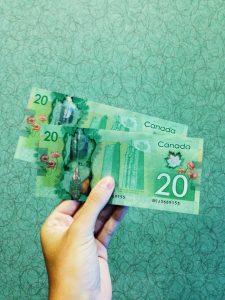Quick Saving Money Tips for a Student who Needs Them (Me)
I’ll be honest. As much as this post was written to help someone in need out there, I am one of those people who need quick financial tips, badly.
So many times, I have been faced with the most crucial, life-threatening decision: make coffee at home, or stop by Biblio on the way to class? By the opening line of this post, I’m sure you can tell which option I usually choose.
Know that I am not a financial expert, but I’ve done (some) of the research for you. In no way am I suggesting that you need to try them all, or even any of them – everyone has their own system! But here are some of my favourite quick tips for saving money:
Make a Budget Binder
This is something I did successfully about three years ago, and no matter how many times I tell myself to get back in the habit, I haven’t. But there is a time for everybody to change.
With a budget binder, you set a budget for different things you need and want to pay for including food, gas, clothes, etc. Then you print out a monthly table to track your spending — how much you spent, where, what it was, and the date of the purchase. Sure, you could just look at your debit statement, but physically writing it out makes it more conscious. At the end of the month, you total everything into the categories you laid out for budgets previously and compare how much you spent with the budget you gave to yourself.
The biggest thing here is keeping yourself accountable. It’s easy to tap your card without even realizing how much you’re spending.
 Download Wellspent
Download Wellspent
This is basically the app version of a budget binder. Wellspent compiles your spending and then asks you to rate how you feel about the purchase, good or bad.
This is a way to track how necessary a purchase was a make, so you think twice about it in the future. You can manually enter in spending (cash or card), or link a card so that the app tracks it for you.
Load Money on Your OneCard in Advance
If you have an extra bit of money come your way, such as during the summer if you work full time, try to load your OneCard with an amount that will get you through at least a couple months of on campus spending. You’ll thank yourself later!
Use Cash
***Disclaimer: As I’m sure you’re aware, cash is not the safest option during the COVID-19 pandemic. I wrote this post before this situation escalated, and have been working on it for a while. Keep this tip in mind for when life returns to normal 🙂
It’s so easy to become addicted to debit and credit card use in a world that makes using them so efficient. But tapping can become mindless, and we often lose track of how much we are actually spending on our cards. No one likes the shock of looking at their online banking and finding they have much less than they thought they did.
Using cash makes money tracking much more conscious. For budget purposes, you can also take out a certain amount of cash per week/month and only allow yourself to spend that amount.
The $5 Bill Jar
I personally have never tried this one, but this is a super popular year-long saving challenge. The idea is to put aside every $5 you encounter into some sort of jar or box, which doesn’t seem like a lot, but by the end of the year you could have a couple hundred dollars. This would also go nicely with a transition to using cash more often!
Buy Second-Hand Clothes
Not only is this a great idea to support the environment, but it is also cost-effective! I have found many awesome pieces at the wide range of Thrift Stores around Victoria, and online reselling outlets like VarageSale and Facebook Marketplace.
Put Your Cash Savings in a Bottle
The point of this is to make it hard to get to, preferably in a glass bottle with a narrow top opening, so that you’ll most likely have to break it open to access the cash. I found this particularly useful to save for future trips and concerts. It helps to have an opening date so you can justify to yourself not opening it sooner.
Pick a “No Spend” Item/Place Each Month
Each month, pick an item or a business that you frequently spend money on, and vow to not spend on it for the entire month. Think about how much you’d save without that daily Starbucks!





